Mary Kingswood's Blog, page 41
August 5, 2018
Review: False Colours by Georgette Heyer
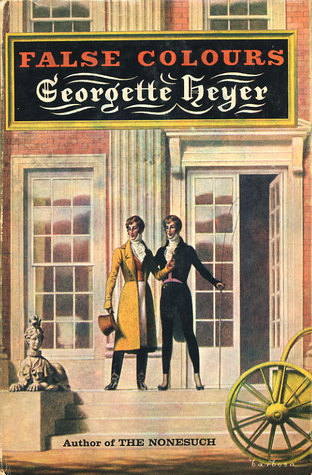 There’s something magical about an identical twin story, and this one is about as good as they come. Kit Fancot, as the younger brother, has taken up a diplomatic career. When he returns to England, he finds his brother Evelyn has disappeared, while on the brink of a very sudden betrothal. All the lady’s relations have been gathered to meet Evelyn, and to save his brother from embarrassment, Kit agrees to impersonate him.
There’s something magical about an identical twin story, and this one is about as good as they come. Kit Fancot, as the younger brother, has taken up a diplomatic career. When he returns to England, he finds his brother Evelyn has disappeared, while on the brink of a very sudden betrothal. All the lady’s relations have been gathered to meet Evelyn, and to save his brother from embarrassment, Kit agrees to impersonate him.
He scrapes through the meeting and retires to the family estate to hide away until Evelyn turns up again, but the young lady’s formidable grandmother invites herself and her granddaughter to stay with them. This is a crisis, so Kit’s widowed mother invites some starchy relations and one of her beaux to join them. Thus begins one of the most awkward house parties ever, not helped by Kit and the young lady, Cressy, beginning to fall in love.
Of course Evelyn eventually turns up again, having fallen in love himself, and the brothers have to dream up some ingenious way to swap back their identities and pair up with their chosen ladies, without creating a scandal. The whole book is delightful, and one of the funniest Heyers ever. As with many of her tales, the principal characters are perfectly rational people, but the side characters are gloriously over the top.
Lady Denville is clearly based on the outrageously extravagant Duchess of Devonshire, completely dippy about money but so charming that nobody ever minded. Well, except her late husband, who was a hard-nosed sort of bloke and gave her a rotten time. Sir Bonamy Ripple, her vastly overweight but very wealthy admirer, is no doubt based on the Prince of Wales, or Prinny, himself. These two, and the formidable grandmother, provide most of the entertainment, and the dialogue is utterly brilliant. The scene where Lady Denville persuades perpetual bachelor Sir Bonamy to marry her is masterful.
Naturally all’s well that ends well, everyone ends up with the most suitable partner (yes, even Sir Bonamy!) and scandal is averted. Five well-earned stars.
July 25, 2018
Review: The Nonesuch by Georgette Heyer
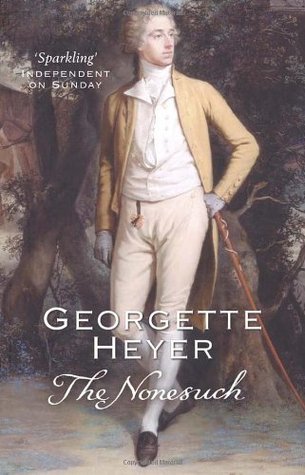 A delight from start to finish. A hero and heroine who are both sensible, reasonable people, a young buck who manages to be perfectly gentlemanly, a ‘villain’ who still manages to be sympathetic despite his total selfishness, and a plot that rattles along nicely without any eye-rolling moments. What could possibly go wrong? Well, I’ll come to that.
A delight from start to finish. A hero and heroine who are both sensible, reasonable people, a young buck who manages to be perfectly gentlemanly, a ‘villain’ who still manages to be sympathetic despite his total selfishness, and a plot that rattles along nicely without any eye-rolling moments. What could possibly go wrong? Well, I’ll come to that.The premise: to the disgust of his less well-heeled relatives, Sir Waldo Hawkridge has inherited a run-down property in Yorkshire from the reclusive Joseph Calver. To the delight of the locals, Sir Waldo, known as the Nonesuch for his sporting abilities, arrives to inspect the property, with his cousin Julian, Lord Lindeth, in tow. Julian’s escaping the efforts of his fond mother to see him rise to stellar heights in London society. He, however, prefers a quiet country life.
The locals are determined to make the most of these unexpected arrivals, and launch a season of outings and parties and general gaiety, with the less than subtle intention of securing one or both of the gentlemen for one of the local girls. Julian is instantly smitten by the devastatingly beautiful Tiffany Wield, while Waldo is drawn to her cool, composed and oh-so-elegant governess-companion, Ancilla Trent.
And so begins the dance. Waldo and Ancilla both, in their different ways, contrive to keep Julian out of Tiffany’s clutches, Ancilla by playing on Tiffany’s self-interest, and Waldo by manoeuvring Tiffany to show her worst, self-centred, temper-tantrum self in front of Julian. And this goes along so swimmingly that Tiffany decides to run away and recruits the equally self-centred cousin Laurence to her cause, a mistake of huge (and very entertaining) proportions.
All of this is delightful, and our two principals are merrily falling in love and on the brink of their happy ending, but naturally this wouldn’t be a Regency romance if two rational adults simply fell in love and got married, and so we come to the inevitable obstacle. Surely it can’t be…? But it is. Once again a perfectly decent story is mucked up with The Great Misunderstanding, of the sort that could easily be sorted out in two minutes if the hero and heroine just talked to each other.
Which is disappointing, but luckily the hero is a sensible man who doesn’t storm off in a huff or (as in some books) immediately betroth himself to some hideously unsuitable person. Instead, he keeps asking the heroine ‘Why not?’ every time she refuses him, by which means the matter is eventually resolved. Thank heavens for sensible heroes!
Despite the annoyance of The Great Misunderstanding, the rest of the book was overwhelmingly enjoyable, and it was all cleared up quickly so I’m not going to knock off a star. Plus I rather liked Waldo – one of the better heroes, I think. So, five stars.
July 13, 2018
Review: The Youngest Dowager by Louise Allen
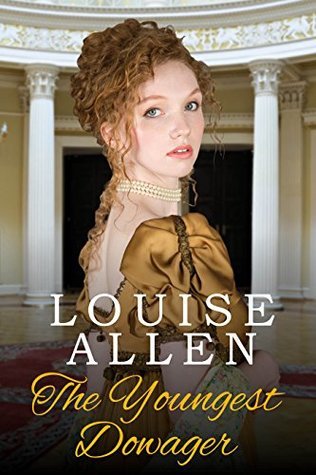 I’m not at all sure what to make of this one. On the one hand, I devoured it with relish, storming through the pages at a rate of knots. On the other hand, it has a number of aspects that make me roll my eyes so hard my head is spinning.
I’m not at all sure what to make of this one. On the one hand, I devoured it with relish, storming through the pages at a rate of knots. On the other hand, it has a number of aspects that make me roll my eyes so hard my head is spinning.The premise is excellent. Marissa was married at seventeen to the much older Earl of Longminster at the command of her father. He was a cold and controlling man, and she can hardly believe that she’s now free. The new earl, Marcus, newly arrived from the West Indies, is very like his predecessor in looks, but not in personality. The two are drawn together, but she’s reluctant to get involved. He thinks her coldness towards him is because she’s still in love with her husband, and she thinks that all men are like her late husband. So far, so interesting.
But the plot soon becomes implausible, and in places downright preposterous. Marissa can hardly turn round without bumping into Marcus, usually at a moment when her secretly passionate nature is to the fore and she’s doing something hoydenish, and frequently when they’re alone. Almost at once, he’s claiming a passionate kiss and (surprise!) she responds to him. And then backs away hastily, remembering that he’s a man and therefore The Enemy.
This back and forth goes on for pretty much the whole book, with the encounters getting more and more ridiculous. Would you believe that a very proper Regency lady, a countess, no less, goes riding secretly at night, astride, naturally, and then goes skinny-dipping in the sea? No? Nor would I, but so it is. And would you believe that her secret ride is observed by the earl, who immediately summons his horse and chases after her, even stripping off and dashing into the sea to rescue her, gallant hero that he is? Well, he thought she was trying to kill herself. Of course he did. And he needed to console her pretty thoroughly after rescuing her. Of course he did. My eyes were rolling pretty hard at this point.
But you know what? It was a great scene anyway, and I loved it. The author is a terrific writer, however wacky the plot, and the story just carried me along. I had a lot of sympathy for Marissa, who had had a pretty horrible life and was naturally finding it a bit difficult to put herself in the power of another man. Marcus I found more difficult to like. He veered about too randomly for my liking, grabbing kisses at the most inappropriate times, and in a fairly domineering way, deciding that he’ll marry Marissa seemingly out of the blue, getting mad at her, displaying a violent temper and then bantering with her in a light-hearted manner completely out of keeping with his previous moods. He just didn’t make much sense to me.
And yet somehow, in all this hot mess of contradictions and misunderstandings and wrong assumptions on both sides, even including that tired old cliche, the mistress that’s in his past but the heroine doesn’t know that… sigh… it all works and I really enjoyed the romance. The sex scenes are hot (and fairly graphic, so if you’re not into that, steer clear), there’s real chemistry between the hero and heroine, and there was definitely emotional depth to it as Marcus discovers just what sort of a husband his predecessor was, and Marissa gradually learns to trust him and open up a bit. There are some fairly minor side plots, and the wayward sister (another tired old cliche) is pretty silly, but it was the main romance that made the book for me.
Even the several times my pedant-o-meter went off didn’t spoil my enjoyment. Drapes instead of curtains, for instance, or Marcus being called an Honourable (I spent ages trying to figure out a way to make him so before finally giving it up as an error). I wasn’t comfortable with all the ladies being in full mourning for over a year, either, because the Regency was far more flexible about that, but none of this spoilt my enjoyment, and the book was so well written and so accurate in most other respects, that I gave the author a pass. And she got a shed-load of brownie points for a couple of beautifully correct introduction scenes (most authors are far too casual about it; proper introductions were hugely important in Regency society).
A great read for those who like a spicier Regency, but the implausibilities keep it to four stars.
June 21, 2018
Review: ‘A Civil Contract’ by Georgette Heyer
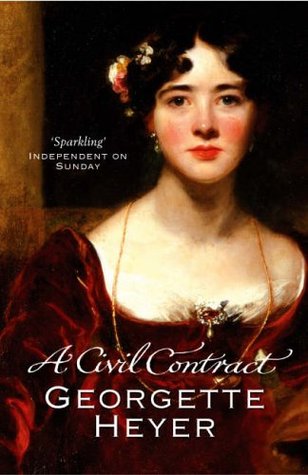 This is an amazing book. Not only does it have Heyer’s trademark range of eccentric characters and humour, but it has an emotional resonance unusual for this style of book. The root problem is one that’s bothered me, too, as I write my own Regency romances – what would a marriage of convenience really be like? Modern folk are so accustomed to the idea of romantic love matches that we can’t quite get to grips with the reality of a pragmatic, loveless marriage of near-strangers. It would have been easier for the wealthy, with their separate bedrooms and almost separate lives for men and women, and the formality of Regency manners would have helped, but even so, most modern Regencies gloss over the difficulties. The hero and heroine have a few dust-ups before deciding that, actually, they’re in love after all, so cue the violins. But I wonder just how likely that would be.
This is an amazing book. Not only does it have Heyer’s trademark range of eccentric characters and humour, but it has an emotional resonance unusual for this style of book. The root problem is one that’s bothered me, too, as I write my own Regency romances – what would a marriage of convenience really be like? Modern folk are so accustomed to the idea of romantic love matches that we can’t quite get to grips with the reality of a pragmatic, loveless marriage of near-strangers. It would have been easier for the wealthy, with their separate bedrooms and almost separate lives for men and women, and the formality of Regency manners would have helped, but even so, most modern Regencies gloss over the difficulties. The hero and heroine have a few dust-ups before deciding that, actually, they’re in love after all, so cue the violins. But I wonder just how likely that would be.
Here’s the premise: Adam Deveril is summoned home from his soldiering on the continent when his father dies. He discovers to his horror that the estate is virtually bankrupt. His mother’s portion is secure, but there’s no money for a season for his sister, or a dowry, and even the treasured family home will have to be sold. There’s just one way out – to marry a wealthy heiress, selling his viscountcy to the daughter of some upstart city merchant. And here Heyer adds the cruel twist that gives the book so much of its emotional depth – such a marriage, while it saves Adam and his estate, would destroy for ever his chance of marrying the love of his life, the beautiful, if highly-strung Julia Oversley.
Through Julia’s father, Adam is introduced to the plain and shy Jenny Chawleigh, and even her name is dowdy (her given name is the much prettier Jane, but everyone calls her Jenny). She’s been well educated, so her manners are good, but her style of dress is of the ‘more is more’ type, with lace and flounces and jewels dripping everywhere. And here is one of the most interesting elements of the book – the culture clash between Jenny’s wealthy but uncultured upbringing and Adam’s far more refined background in the upper echelons of society.
The epitome of this culture clash, of course, is the character who towers over the book, dominating every scene he is in – Jonathan Chawleigh, the extremely wealthy ‘cit’ (a banker, industrialist or merchant from the city of London), Jenny’s rough and ready father. Mr Chawleigh knows perfectly well that he won’t fit in with Adam’s upper class friends, and assures him he will keep out of the way. That doesn’t stop him from stepping in to splash his money about on his behalf. When Adam decides to sell the family’s town house, Chawleigh secretly buys it and has it refurbished to his own vulgar taste while the newly weds are on honeymoon. Such episodes are a sore trial of Adam’s good manners.
All of this is delicious, and very funny, but the real heart of the book is the slowly developing relationship between Adam and Jenny, and the parallel choices of his cast-off love, the melodramatic Julia. Many readers find Adam and Jenny’s story a sad one, the surrendering of intense romantic love for the quieter affection of shared interests and a comfortably placid life. I think it’s a beautiful realisation of the joy of a real marriage, one that’s fuelled by genuine affection rather than the fireworks of instant attraction. Love, rather than infatuation. A wonderful and thought-provoking read. Five stars.
June 20, 2018
TV series review: Pride and Prejudice (1995)
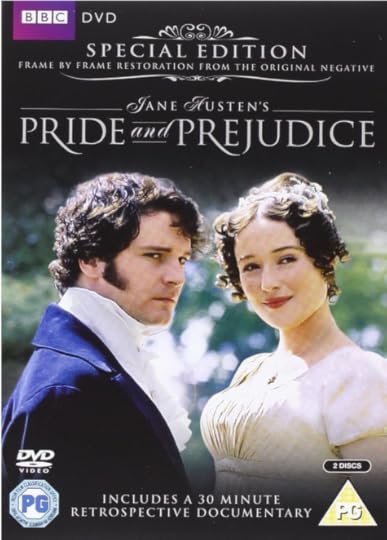 What is there to say about this that hasn’t been said a thousand times already? This is the definitive version, the Colin Firth and Jennifer Ehle version, the diving-in-the-lake version, the one that spawned a whole new love affair with Jane Austen and a spate of new dramatisations and inspired-by films, books and TV productions. I’ve been rewatching it for the fourth or fifth or sixth time, and enjoying it just as much as before, perhaps more so now that I know a little bit more about the Regency era than I did. Here are some random thoughts.
What is there to say about this that hasn’t been said a thousand times already? This is the definitive version, the Colin Firth and Jennifer Ehle version, the diving-in-the-lake version, the one that spawned a whole new love affair with Jane Austen and a spate of new dramatisations and inspired-by films, books and TV productions. I’ve been rewatching it for the fourth or fifth or sixth time, and enjoying it just as much as before, perhaps more so now that I know a little bit more about the Regency era than I did. Here are some random thoughts.
The first thing that struck me is how quickly it becomes obvious that Darcy is in love with Elizabeth. In previous viewings, Firth’s Darcy seemed like a bit of a stiff-necked so-and-so, whose proposal at Hunsford comes out of the blue. Yet his face often shows a softness as he looks at Elizabeth. Why did I never notice this before?
The second thing is that Alison Steadman’s Mrs Bennet finally grated on me. I’ve read so many reviews complaining about her shrillness, but this was the first time I really noticed it.
I noticed, too, just how licentious Lydia is almost right from the start. When she bumps into Mr Collins on the landing, when she’s in her underwear, any well-brought-up young lady would be mortified, but Lydia screams with laughter. And she wants to go into Meryton early one day in order to catch the officers before they’re dressed (probably not seriously, but she shouldn’t even be thinking about such things).
Most of the characters I think are pretty well perfect for their roles. Mr Collins, Mr Bennet, Mr Bingley and Mr Darcy are incomparable. Elizabeth I have reservations about, but I like her better with each viewing. I’ve never much liked Miss Bingley. She seems too obvious in her pursuit of Mr Darcy (but I suppose she is in the book as well).
I really liked that the six-episode format which gave the story room to breathe. No minor characters got wiped out, pretty much all the important scenes survived intact and there were few changes to the dialogue. I’m a particular fan of the piano scene at Rosings, where Elizabeth is to all intents and purposes flirting with Darcy through the medium of Colonel FitzWilliam (”Shall we ask your cousin why…?”). I adore this scene, because to her it’s lightweight joking around, but he’s genuinely responding to her and openly paying her compliments (”Your time has been much better spent.”). And his face when he looks at her is quite adoring. No wonder he assumed she was waiting for him to pay his addresses!
The letter is handled really well in this version. We see both Darcy’s determination to write it, staying up all night, and then Elizabeth’s reactions to it (’Insufferable presumption!’). And then the irony of her visit to Pemberley, when the housekeeper is praising Darcy to the skies, Mrs Gardiner is very confused and Elizabeth is unable to explain the discrepancy. And then the awkwardness of meeting Darcy again, his overwhelming civility and the way Mrs Gardiner immediately jumps to the obvious conclusion. This was all wonderful. And the meeting with Miss Darcy and Mr Bingley at the inn is perfect.
If I have any complaint at all about the later scenes, it is that the proposal falls short of expectations. Yes, it’s exactly as per the book, but, given the passion of earlier scenes – the first proposal, that moment of revelation in the inn when Elizabeth has just discovered Lydia’s folly, and the spirited debate with Lady Catherine – the final proposal really needs some fireworks. It needed it in the book, too, and it’s one of very few instances where I’d have been in favour of a little artistic licence.
But that apart, this version is, to my mind, well-nigh perfect. It stays true to the words and the spirit of the original, it captures the essence of all the characters, the acting, settings and costumes are awesome, and it gives the story the room it needs to breathe. The ensemble scenes, like the Meryton assembly and the ball at Netherfield are handled brilliantly, with little vignettes constantly firing off in the background, and all the major scenes are beautifully done. Scarcely a mis-step in the whole production.
June 13, 2018
Review: Gabriella by Brenda Hiatt
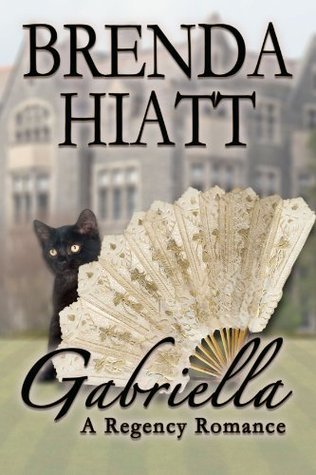 This was a disappointment. The premise is fun, if not wildly original (it’s basically the plot of Georgette Heyer’s Arabella, with a few minor variations), but the execution is not all it might be. The characters have some charm, but the writing lacks lustre, with dialogue that feels too modern and a number of historical inaccuracies.
This was a disappointment. The premise is fun, if not wildly original (it’s basically the plot of Georgette Heyer’s Arabella, with a few minor variations), but the execution is not all it might be. The characters have some charm, but the writing lacks lustre, with dialogue that feels too modern and a number of historical inaccuracies.
Let’s deal with the plot first. Gabriella (shortened infelicitously to Brie) is an impoverished younger daughter of a veterinary surgeon, about to be launched into society by her social-climbing and catty older sister Angela. At an inn en route, she sees a maltreated horse and gives the owner a piece of her mind. He, having been interrupted in mid-seduction, isn’t best pleased. But back in London, he’s lost a wager, and finds that his penance is to bring out country-mouse Gabriella (sorry, I refuse to call her Brie; that’s a cheese, not a person). Needless to say, he’s a duke (aren’t they all?).
So far, so good. Of course, anyone who’s read a few Regencies could plot out the rest of the book – the reluctant early meetings, the growing attraction, the rival suitor who turns out to be a cad, the realisation of True Love just when All Seems Lost, and naturally, the Misunderstanding. Heaven preserve me from misunderstandings. But none of this is a problem, because with a light hand, some lively dialogue and some amusing side characters, this could be a delightful piece of froth. I actually believe that the author’s capable of that, for the bare bones were there, but it just fell a bit flat for me and was too solemn to be properly entertaining.
The biggest problem was the number of historical inaccuracies. The sister must be the world’s worst chaperon, for she allows Gabriella to gad about on her own with her suitors and to wander about unattended at balls and the like. The duke even takes her to Almack’s with only his younger, unmarried sister with them, which leaves both of them unchaperoned. And then he waltzes with her without the explicit permission of one of the patronesses (he says he’s asked, as if that would cut any ice!). And then he generously gives permission for Gabriella’s suitors to call on her the next day, as if he had any right!
I could go on, because there were a lot of these niggly little things that don’t matter much to most people, but knocked me out of immersion right away. But hey, I’m nit-picky about this stuff. And I don’t think she’d call him by his first name, even when he asked her to. She might show her intimacy by calling him Ravenham instead of your grace, but not Dexter (another shockingly unRegency name).
On the plus side, the romance, once it gets going, is rather charming, I liked the two main characters and the editing is up to scratch, and it’s a pleasant, undemanding read. I’m sure it would work fine for anyone who’s less pedantic than me about details. I understand this was the author’s first foray into the genre, and there’s enough promise in this to make me want to try a later one. Even so, there were enough niggles to keep it to three stars for me.
Review: The Unknown Ajax by Georgette Heyer
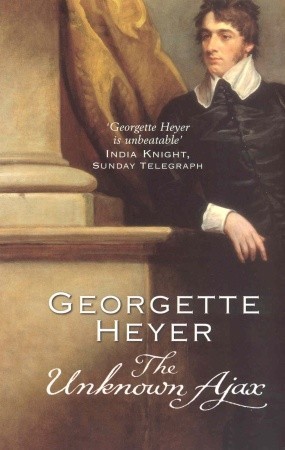 Well, Hugo’s a charmer, and no mistake. Coming to this directly after Venetia is a bit of an eye-opener, for the contrast between sophisticated rake Damerel and straight-down-the-line Hugo could hardly be more marked. The leading ladies are very different, too, but whereas Venetia leaps off the page in all her self-assured glory, Anthea is very much a minor note to Hugo’s symphony. For this book is all about Hugo, make no mistake.
Well, Hugo’s a charmer, and no mistake. Coming to this directly after Venetia is a bit of an eye-opener, for the contrast between sophisticated rake Damerel and straight-down-the-line Hugo could hardly be more marked. The leading ladies are very different, too, but whereas Venetia leaps off the page in all her self-assured glory, Anthea is very much a minor note to Hugo’s symphony. For this book is all about Hugo, make no mistake.
The premise is an intriguing one: irascible Lord Darracott has lost his eldest son and grandson in a boating accident. Now his heir is the unknown son of second son, who disgraced the family name by marrying a Yorkshire weaver. Lord Darracott summons the heir to Darracott Place, and also summons various other members of the family to meet him and whip him into shape, because he’s bound to be an ill-mannered oaf, isn’t he?
Hugo, when he arrives and realises the low expectations of him, amuses himself by playing up to his relations’ worst fears, by laying on the Yorkshire brogue with a trowel, and playing the bovine bumpkin to perfection. It’s the ladies, interestingly, who spot the deception first, and dear old grandpapa, grumpy old sod that he is, never quite gets to grips with it until the end.
Surrounding Hugo is a pantheon of brilliantly realised characters: Claud the fop, Vincent the sardonic Corinthian, Matthew the plodding unambitious one, Richmond the spoilt brat, Lady Aurelia the above-the-fray aristocrat and poor, harassed Mrs Darracott, not to mention the delightfully competitive valets, Polyphant and Crimplesham. All of this comes together into one gloriously over-the-top ensemble performance at the end, as the comedy descends into barely contained farce.
All of this is delicious, of course, but it isn’t a romance. The love interest, Anthea, is a perfectly normal, rational woman, intelligent and calm in a crisis, and with the wit to spot that Hugo isn’t nearly as oafish as they’d expected. That makes her a perfectly acceptable heroine, but in company with the sort of dazzling characters of Heyer at her best, Anthea is reduced to a dull glow, not the vivid brilliance of (say) a Sophy or a Venetia. Even when she bandies words with Hugo, she invariably loses the battle of wits, as she recognises herself. There are no fireworks in their romance, and no passion – it comes down to two people who liked each other almost from the first, became friends and… er, that’s about it, really. One review says that they ‘fell in like’, which sums it up beautifully.
One of the usual irritants that isn’t so obvious in this book in Regency cant, and just as well, because Hugo’s speech is stuffed full of Yorkshire dialect, and boy does that get old quickly. Once everyone was aware that he wasn’t an uneducated lout, the dialect could have been dropped altogether, for my money.
For those who read Heyer for the eccentric characters and the riotous escapades, this should be right up your alley. For me, while I loved Hugo to pieces and he is one of my all-time favourite Heyer heroes, almost up there with dear Freddy, the tame romance and that oh-so-annoying dialect keeps this to four stars.
May 23, 2018
Review: ‘The Kydd Inheritance’ by Jan Jones
 Here’s the premise: Nell’s father has died suddenly, her brother has disappeared and is believed dead on his way home from India, and her mother is away with the fairies much of the time. Meanwhile, her uncle is mismanaging the estate, the money for Nell’s season has vanished and the only suitor is one she wouldn’t dream of accepting. And then a mysterious stranger arrives, and starts behaving in an odd manner. What’s a girl to do? Why, resort to deception and subterfuge, that’s what.
Here’s the premise: Nell’s father has died suddenly, her brother has disappeared and is believed dead on his way home from India, and her mother is away with the fairies much of the time. Meanwhile, her uncle is mismanaging the estate, the money for Nell’s season has vanished and the only suitor is one she wouldn’t dream of accepting. And then a mysterious stranger arrives, and starts behaving in an odd manner. What’s a girl to do? Why, resort to deception and subterfuge, that’s what.I don’t remember now why I picked up this book. Maybe I read about it somewhere, or tripped over it on Amazon as I bounced around the ‘also boughts’ from one book to another. Something drew my eye, but for the first few chapters, I couldn’t for the life of me see why. The situation was not terribly original, the mystery didn’t seem to be too difficult to work out, and I could see pretty much how things were going to go. There were flashes of something more hidden beneath the surface, but it didn’t set me on fire.
But then everything shifted up a gear, as if the author had suddenly got into her stride, and the thing exploded into the most glorious fun. There are moments in this book that will stay with me for ever, such as ‘Cousin Jane’ going out for the evening – positively delicious. The dialogue sparkles in best Georgette Heyer-style, the minor characters are delightfully eccentric and the principals are wonderful. The romance comes slowly to the boil, in quite the best way, the hero is swoon-worthy and the heroine is feisty and intelligent without being too modern.
For sticklers for historical accuracy (like me), this seemed to me to be resoundingly well researched, and with a writing style that effectively captures the era without tripping up the modern reader. The only off note was the heroine setting off to do her ‘marketing’. As a Brit, I’ve never encountered this expression, and find it hard to believe that any gently-brought-up young lady would actually go food shopping (that’s what servants were for). The heroine also seems to make a lot of her own clothes, but I suppose she had been reduced to a poverty-stricken state.
The climax is less silly and more plausible than in many other Regencies (translation: it was pretty silly, in a lot of ways, but by this point in the book I was sufficiently invested that I didn’t mind). And then the book ended in the best possible way – with the villain routed, a thoroughly believable HEA, a big kiss and me with a huge grin on my face. Highly recommended. Five stars.
May 22, 2018
Review: ‘Venetia’ by Georgette Heyer
 Hooray for a heroine who is smart, resourceful and knows her own mind right from the start! So many of Heyer’s heroines somehow don’t recognise their own feelings until the hero sweeps them into his manly arms and kisses them thoroughly, but Venetia is not of that type. She sees her soul-mate in Damerel almost at once, and isn’t the slightest bit deterred by his rakish past. In fact, at the end of the book, her urgency in wanting to get back to him is as much driven by fear that he will take another mistress as anything else.
Hooray for a heroine who is smart, resourceful and knows her own mind right from the start! So many of Heyer’s heroines somehow don’t recognise their own feelings until the hero sweeps them into his manly arms and kisses them thoroughly, but Venetia is not of that type. She sees her soul-mate in Damerel almost at once, and isn’t the slightest bit deterred by his rakish past. In fact, at the end of the book, her urgency in wanting to get back to him is as much driven by fear that he will take another mistress as anything else.
Venetia is twenty five, and has lived secluded all her adult life, firstly by the vagaries of her eccentric father, and later by the need to deputise for her absent brother, the heir to the estate, and her highly intellectual younger brother, who has a leg damaged by childhood illness. She is pursued by two dogged swains. One is a suitable and worthy but deadly dull man, who never respects Venetia enough to believe her when she says she doesn’t want to marry him. In fact, he never believes anything she says, because he’s a man and he knows better. The other is very young, suffering from over-romantic calf-love.
Into this state of stasis drops the owner of the neighbouring, much neglected, estate, Lord Damerel, a renowned rake and ne’er-do-well. As is very commonplace in these stories, his every action within the confines of the book are perfectly respectable (with one exception – his first meeting with Venetia). But from then onwards, he lives a blameless, not to say generous and open-hearted, life, setting his estate in order, taking Venetia’s hard-to-manage brother in hand and behaving with perfect propriety towards Venetia herself. It’s claimed that his objective is to seduce her, but frankly he never steps outside the bounds of propriety once, so it’s hard to believe.
The romance in this book is one of the most natural and charming that Heyer ever wrote. These two are perfect friends, getting along so well that you wonder quite how they can ever be kept apart. But kept apart they are, and for that stupid old chestnut of a reason, ‘the heroine’s own good’. Fortunately, Venetia discovers the truth and, being a resourceful lady, sets about securing her own happiness with great determination. My eyebrows rose at her journey all alone on the mail coach, and there’s just a touch of deus ex machina in the way she resolves her difficulty, but whatever.
Venetia’s family, even the always absent heir, Conway, is steeped in selfishness. The father withdrew into seclusion, trapping Venetia with him. The older brother is both selfish and indolent, one of those people who just never knuckles down to doing anything that might make him the slightest bit uncomfortable. The younger brother is immersed in his books, to the point of barely noticing the existence of his sister. And the mother – well, let’s just say she was pretty selfish, too. So it comes as no surprise that when it come to the crunch, Venetia decides to be selfish, too, and grab her happiness by the scruff of its neck, regardless of her family. And of course Damerel has always been selfish, too. I do wonder whether he will reform or not. The two have this delightful discussion at the end of the book, and I’m not at all sure whether this is serious, or only partly serious or all in fun:
‘You’d know about my orgies!’ objected Damerel.
‘Yes, but I shouldn’t care about them, once in a while. After all, it would be quite unreasonable to wish you to change all your habits, and I can always retire to bed, can’t I?’
‘Oh, won’t you preside over them?’ he said, much disappointed.
‘Yes, love, if you wish me to,’ she replied, smiling at him. ‘Should I enjoy them?’
He stretched out his hand, and when she laid her own in it, held it very tightly. ‘You shall have a splendid orgy, my dear delight, and you will enjoy it very much indeed!’
The final scenes are lovely, and there’s the usual array of wonderful minor characters to enjoy. This is more wordy and introspective than many Heyers, and I didn’t find either of the two suitors worthy of the amount of words expended on them, but never mind. A terrific heroine, a charming and un-rake-like hero and a wonderful romance – five stars.
Review: ‘Snow Angel’ by Mary Balogh
 One of the things that Mary Balogh does brilliantly is to take a wildly unusual situation, toss her characters into it and leave them to sink or swim accordingly. In this case, Rosamund and Justin meet entirely by chance on the road in the middle of a snowstorm. She has just quarrelled with her brother and sets out to walk – somewhere, anywhere. He is trying to recover something from a planned week of pre-wedding debauchery where all the other participants have cried off. They escape the snow in a hunting lodge, and, since she’s a widow curious about sex with a younger man, and he was expecting a week of sex anyway, they retire to the bedroom pretty quickly. And then, a month later, they meet up at a house party where he is expected to propose to her niece. How very awkward.
One of the things that Mary Balogh does brilliantly is to take a wildly unusual situation, toss her characters into it and leave them to sink or swim accordingly. In this case, Rosamund and Justin meet entirely by chance on the road in the middle of a snowstorm. She has just quarrelled with her brother and sets out to walk – somewhere, anywhere. He is trying to recover something from a planned week of pre-wedding debauchery where all the other participants have cried off. They escape the snow in a hunting lodge, and, since she’s a widow curious about sex with a younger man, and he was expecting a week of sex anyway, they retire to the bedroom pretty quickly. And then, a month later, they meet up at a house party where he is expected to propose to her niece. How very awkward.
Of course, this requires some sleight of hand. How could she not know who he is? Because he fails to introduce himself properly, that’s how. He tells her he’s Justin Halliday instead of the Earl of Wetherby, and frankly, there’s no way on earth he would ever do that unless, for some unfathomable reason, he was deliberately intending to deceive her. So already there’s some suspension of disbelief involved. Then there’s the sex aspect, and while he might not worry too much about a possible pregnancy, the fear of an illegitimate child was great enough to make most respectable women think twice about it. And I don’t believe for one moment that Regency women were sufficiently knowledgeable about ovulation to use it as a contraceptive device. This is a time when medical practices revolved around balancing the humours in the body, and bleeding the sick with leeches and cutting. So telling him that she’s unlikely to get pregnant is hugely implausible.
So the house party goes along merrily, and Justin is too committed to draw back, but his intended has been given the freedom of choice. If she had half a brain in her head, she would have told him she was in love with someone else. I get that there was a huge weight of expectation there for a marriage which had been planned for years, but the whole business was drawn out to the nth degree, and seemed quite silly to me. And meanwhile Justin and Rosamund are busy trying to keep their hands off each other, and not succeeding terribly well.
Naturally, everything gets resolved satisfactorily in the end, but not because of anything the hero or heroine did. I would have liked to see more emphasis on the absolute impossibility of the hero backing out of his engagement under Regency societal rules, because without that he just looks like a wimpy dithery sort of guy, trying to string both women along and unable to summon up the gumption to do what’s necessary.
This is as well-written as all Balogh’s books, and I loved the premise and the sex-fuelled first half, but the flaws in the plot and the long-drawn-out second half keep it to four stars.



